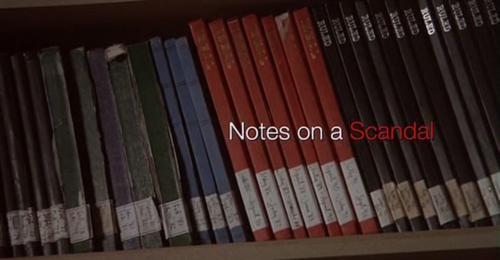Moviegoers seeking a simple, erotic film laden with illicit trysts between a teacher and student may be left unsatisfied with
Notes on a Scandal. While an affair between a teacher, Sheba (Cate Blanchett), and high school student, Steven (Andrew Simpson) serves as a definitive catalyst,
Notes largely centers around the ambiguous relationship between Sheba and Barbara (Dame Judi Dench), a seasoned teacher at the same London comprehensive school.
Sheba is free-spirited and idealistic about her ability to make a difference in her pupils’ lives. Having been in the education system for decades, Barbara is slightly less optimistic. Despite their different schools of thought, when Barbara offers the fresh-faced Sheba disciplinary advice, a hopeful friendship develops between the two. Unknowingly, Sheba has consented to serve as a replacement for one of Jennifer, Barbara’s former friend who left under unclear circumstances.
Notes is a film that can be continuously (and pointlessly) picked apart in search of a clear protagonist and antagonist. Their relationship mirrors Newton’s third law: For every action, there is an equal and opposite reaction. When Sheba is guilty of infidelity and statutory rape, Barbara also becomes guilty of blackmail. When Sheba sees the best in others, Barbara does as well. When one woman keeps secrets, so does the other. Neither woman can be exclusively deemed saint or sinner.
In cinematography, perhaps this is the highest possible form of feminism. Despite featuring a promiscuous adult and older woman, Notes does not typecast female characters into unrealistic “slut”, “wife material”, and “old bag” categories. Sheba’s husband, children, and paramour are rarities on-screen. In fact, upon his discovery, Sheba reassures her husband that the affair has nothing to do with him. There is minimal focus on Steven and Sheba’s sexual acts. Viewers are forced to wade through action, subtext, and their own gut feelings in search of a clear answer that refuses to reveal itself.
In a memorable scene where Barbara smokes a cigarette while bathing, the following journal entry serves as a voiceover:
“People like Sheba think they know what it is to be lonely. Bot of the drip, drip of the long-haul, no-end-in-sight solitude, they know nothing. What it’s like to construct an entire weekend around a visit to the launderette. Or to be so chronically untouched that the accidental brush of a bus conductor’s hand send a jolt of longing straight to your groin. Of this, Sheba and her like have no clue.”
While Barbara stagnates in her lonely past, Sheba is shrouded in the pleasantry of hers. In a parallel scene, she listens to Siouxsie and the Banshees while applying thick black eyeliner as her youthful lover stands near.
However, when Steven dons a hat that she’s made for her son, Sheba snaps. The children, the son with Down Syndrome and the adolescent daughter, come into focus. The illusion of the past becomes shattered.
Just as an aside, Juno Temple—the young actor who plays Sheba’s daughter—aces her role as a petulant daughter. For those interested in intense, incidentally homoerotic dramas about academia, loneliness and sexual taboo, her role in Notes on a Scandalevokes her performance in Cracks.)
For those seasoned lesbian subtext detectives who—like me—have religiously watched Xena: Warrior Princess and Rizzoli and Isles, there is significant evidence in favor of Barb wanting more than passionate friendship from her colleague:
- In her initial journal entries about Sheba, Barb expresses her belief that she is “the one”; that they could become “companions.”
- During a moment where Sheba is stressed, Barb runs her fingers up and down Sheba’s hands and arms, reminiscing on a time in her schooling where she and her female peers “used to stroke each other.” It makes Sheba uncomfortable.
- When Sheba discovers Barbara’s diaries during the height of her statutory rape scandal, she yells, “So what it it, Bar? You want to roll around the floor like lovers? You want to fuck me, Barbara?” (She also calls “Virginia-Friggin’ Woolf”, yet there are arguably more similarities between Barb and the protagonist of Radclyffe Hall’s “Well of Loneliness.”)
- Barbara is pre-occupied with gold stars.
When picking apart subtext, last names are also relevant. Barbara Covett covets Sheba Hart, who has a lot of heart for her students, including Steven Connelly, who consher into believing that his feelings are much more than pubescent lust.
When Barb accusingly asks Sheba while she continues her relationship with Steven even after Barb blackmails her, Sheba responds, “Secrets can be seductive.” Ultimately, Sheba is hardly the only one guilty of infidelity. Barb’s journals—which inevitably certify her as insane in Sheba’s mind—are well-hidden from her previous and current “companion,” and document her every manipulative action and thought.
Barbara’s one true love is fittingly ambiguous in gender and sexuality: Paper. Even while pursuing Sheba, she still carries on an affair with the notebooks that inevitably speeds up the destruction of her connection with Sheba.
Amid all the ambiguity, only one this is definite: Despite wanting all of her friend, there are still parts of herself which Barbara is unwilling to unveil.
***
While she doesn’t quite have the accent, Sarah Fonseca’s been known to accidently type ‘ya’ll’ in her articles. Thank g-d for copyeditors.
Sarah runs frantically between writing and feminist club meetings on her university’s campus. Fortunately, those two spheres collide more than one would think. She is heavily involved with National Organization for Women, Creative Writing Club, and Random Acts of Poetry at Georgia Southern University.
Sarah is a staff writer for Georgia Southern’s George-Anne newspaper, and occasionally contributes to other publications within the community. Her fiction has been published in The Q Review and recognized by the Harbuck Scholarship committee.
Sarah is currently applying for fellowship with Lambda Literary, and plans to present her paper entitled On the Queering of Hair at next year’s National Women’s Studies Association Conference.









